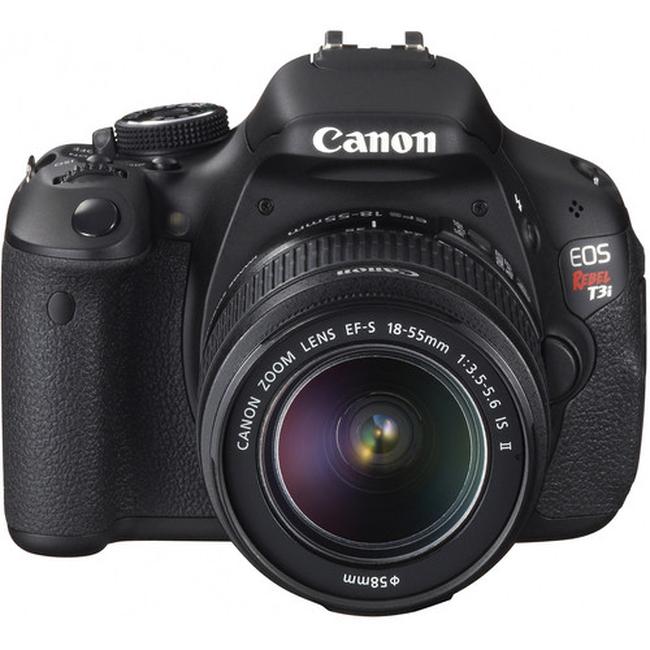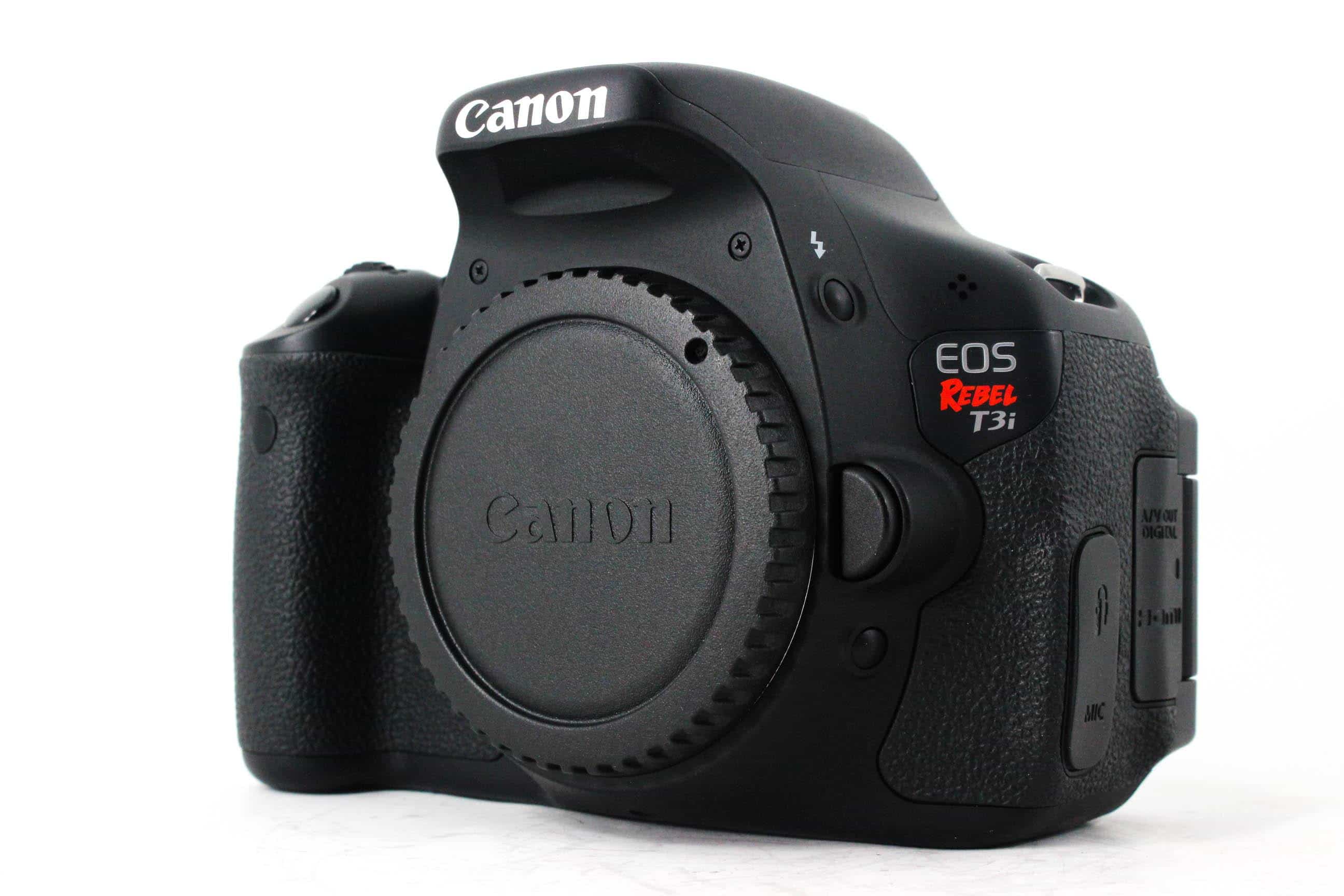When you're just starting out in photography, there's a lot to consider when you buy your first camera.
It doesn't help that we're bombarded with all sorts of numbers and jargon about cameras that, though informative, also serves to confuse people that might not understand what ISO 25600 or APS-C or 6fps stands for.
In this quick guide, I'll cut through all the photography terms and offer up clear, easy-to-understand reasons why beginner photographers should invest in an APS-C camera.
Let's begin!
APS-C Cameras Are Less Expensive

There are some really, really high-end APS-C cameras that are pretty pricey, but by and large, these cameras are less expensive than their full frame cousins.
Here's why: APS-C cameras like the Canon EOS Rebel T3i shown above, have a smaller sensor than those found in a full frame camera. That means a couple of things.
First, the larger the sensor, the more expensive it is to make. Since APS-C sensors are smaller, they're easier on your pocketbook.
Secondly, since the camera body doesn't have to be as large to accommodate a larger sensor, there'sfewer materials required to make APS-C camera bodies. Again, that makes them easier on your pocketbook.
Learn More:
APS-C Cameras Have a Larger (and Less Expensive) Range of Lenses

Because APS-C cameras tend to be geared towards the beginner and intermediate consumer market, there are simply more lenses available than there are for most full frame cameras.
That's obviously an advantage for beginners because as you learn and develop new skills, you can more easily find new lenses to add to your kit.
What's more, lenses for APS-C and other crop sensor cameras tend to be less expensive.
That's because the lenses can be a smaller diameter because the camera's sensor is a smaller diameter as well.
So, entry-level cameras like the Nikon D5300 shown above not only offer a wide range of lenses but you can find lenses for this camera for a better price, too.
Learn More:
It's Easier to Fill the Frame With an APS-C Camera

One of the biggest advantages of an APS-C camera's smaller sensor is that it's cropped, meaning, compared to a full frame camera, there's less of the scene captured by the image sensor.
This isn't a bad thing, either, because with less of the scene captured by the sensor, that means you can more easily fill the frame with your subject.
Filling the frame with your subject is a critical skill to learn because it can help you create an image that has much more visual appeal.
In the portrait above, for example, we're able to have a more intimate view of the person, see their wrinkles, and make contact with their eyes than we would if it had been taken with a full frame camera.
When you're just starting out and learning some of the essentials of composition, at least in this case, an APS-C camera is advantageous.
Learn More:
APS-C Cameras Increase the Effective Focal Length of Lenses

Related to the concept of filling the frame is the notion that an APS-C camera increases the effective focal length of lenses.
That means that where a 50mm lens on a full frame camera behaves like a 50mm lens, on a camera like the Canon EOS 7D Mark II shown above, that same 50mm lens behaves like an 80mm lens.
That's due to the crop factor of the camera, which for Canon APS-C cameras is 1.6x (on Nikon cameras, it's 1.5x).
So, why's that advantageous?
As noted above, having a longer effective focal length helps you more easily fill the frame.
However, it also means that you can get expanded capabilities out of the lenses you use.

For example, rather than buying a short telephoto lens (which is more pricey), you can buy something like the Canon 85mm f/1.8 USM lens shown above (or, if you buy a Nikon camera, the Nikon 85mm f/1.8G).
On a Canon APS-C camera, an 85mm lens behaves like a 136mm lens (on a Nikon it's more like 128mm), which gives you excellent reach if you're photographing something a good distance away.
Another benefit of that added focal length is that you don't have to be as close to your subject to get a nicely framed shot.
Using the 50mm lens as an example, on an APS-C camera, it acts like an 80mm lens, which is perfect for portraiture.
That means you can fill the frame with the subject but without having to be right up in their face to do so.
Learn More:
A Few More Notes on APS-C Cameras

Another benefit of using an APS-C camera as a beginner is that they're simply easier to use.
Since they're targeted at the consumer market (whereas full frame cameras are targeted more to professionals), there's fewer bells, whistles, buttons, features, modes, and so forth to learn.
That can be helpful for beginners as learning photography is hard enough in the first place!
APS-C cameras are also easier to maneuver because they're smaller and lighter weight.

Additionally, even though APS-C cameras have smaller sensors, they still offer plenty of resolution for beginner photography.
For example, the Canon EOS Rebel T3i I spoke of earlier has an 18-megapixel sensor, and the Canon EOS 7D Mark II has a 20.2-megapixel sensor. The Nikon D5300's sensor is even larger at 24.2-megapixels.
For photographers that are just starting out, each of these cameras offers more than enough resolution to create high-quality images.
And even though these cameras are on the lower end of the price spectrum, it's not like you don't get great features.

In fact, all three offer things like JPEG and RAW shooting, HD video capabilities, large LCD monitors for reviewing images and shooting in Live View, and good ISO range, which helps you take images in dim lighting conditions.
All three cameras also have autofocus systems that assist you in obtaining focus on your subject, even if the subject isn't still.
And perhaps best of all, all three cameras can be found at excellent prices, especially if you purchase them pre-owned through a trustworthy website like MPB.
The moral of the story is that APS-C cameras have excellent value, plenty of features, and a very large selection of companion lenses that will help you get into photography with the gear you need without spending a ton of money doing it.
What's not to like about that?
Get more insights on the differences between APS-C cameras and full frame cameras in the video above by Troy Nikolic.
This article about APS-C Camera was first published on our website https://www.photographytalk.com/beginner-photography-tips/why-an-aps-c-camera-is-ideal-for-beginner-photographers